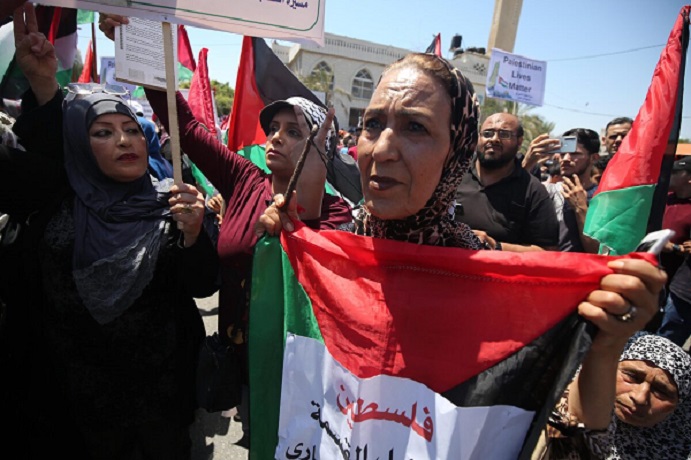
Ramona Wadi
Middle East Monitor / July 7, 2020
From seemingly defiant rhetoric to the expected capitulation, Palestinian Authority President Mahmoud Abbas has offered nothing in terms of a unified Palestinian stance against US President Donald Trump’s deal of the century.
Going back to a compromised international community, ready to negotiate additional losses for Palestinians which will ultimately fail to prevent Israel’s annexation of their land, is not a counter-proposal, as the PA wishes us to believe. A more honest approach would have been a clear statement that the PA’s role is dependent upon donor funding and hence only capable of delivering upon compromised political agendas.
In a call with German Chancellor Angela Merkel on Sunday, Abbas announced his willingness to restart negotiations based upon UN resolutions and the Middle East Quartet demands. In light of Israeli Prime Minister Benjamin Netanyahu’s decision to postpone — not abandon — the annexation of large swathes of the occupied West Bank, the two-state paradigm will once again be touted as “the only solution”. The reality is that the only solution is to dismantle the Zionist colonial enterprise in its entirety.
While it was expected that Abbas would renege on his rhetorical threats, his approach towards the international community, which also appeases Israel, confirms the political game that pitted the two-state hypothesis against the deal of the century; in other words, the international community against Trump. This was a shallow, despicable manoeuvre that ties Palestinian politics perpetually to international demands, because the PA functions as a security apparatus for Israel and a hierarchy presiding over a symbolically recognised, yet non-existent, state.
With Abbas’s decision, Israel boosts its upper hand. The settler-colonial entity considers itself above international law and, in fact, holds it in contempt. Diplomatic negotiations, therefore, present no obstacle to its annexation plans. It is highly likely that if annexation takes place, the international community will take its time but will, inevitably, normalise the violation of international law, while setting the scene to negotiate a non-existent two-state travesty, this being nothing less than legitimising the deal of the century.
International donors fund the illusion of Palestinian state building; they also fund the PA’s security coordination with Israel because, ultimately, the PA does not relish the possibility of Palestinians rising up against the imposed status quo which elevates its status, albeit only within the parameters decided upon by the international community and Israel. Abbas also knows that stopping security coordination will contribute to a complete collapse of its institutions.
As for international opposition to Israel’s annexation, which is already weak and not intended to seek a confrontation with the Zionist state, a scenario can unfold in which not even the most cosmetic of stances opposing annexation will be followed through. The international community’s diplomacy, after all, is based entirely upon the two-state compromise. Abbas may have no choice indeed, unless he is ready to base his politics upon Palestinian demands, which would trigger a complete change in terms of diplomacy.
However, the PA’s repeated excuse that the Palestinian cause has been marginalised by the international community only tells one part of the story. The PA has supported this marginalisation, but it just prefers not to speak about its role in altering the Palestinian political demands of land and refugees’ legitimate right of return, into a global project supporting Israel’s colonial demands. It is a willing accomplice in the international subjugation of the Palestinians.
Ramona Wadi is an independent researcher, freelance journalist, book reviewer and blogger; her writing covers a range of themes in relation to Palestine, Chile and Latin America












